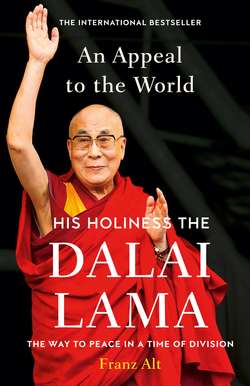Читать книгу An Appeal to the World: The Way to Peace in a Time of Division - Dalai Lama - Страница 6
PREFACE “I DON’T HAVE ANY ENEMIES”
Оглавление“I DON’T HAVE any enemies, only people I haven’t met yet,” the Dalai Lama told me over 20 years ago. He also said, “We have the most to learn from our enemies. In a way, they are our best teachers.” So wise and yet so realistic are the words of the most prominent refugee in the world – and also one of the oldest – after 58 years of exile in India. Even though he has been forced to live outside his Chinese-occupied homeland since 1959, he does not harbor any hatred of Chinese people or their leadership. On the contrary, he sometimes calls himself a “Communist Buddhist” or a “Buddhist Communist” and says he even prays for the Communist leaders in Beijing, adding with a laugh, “In Europe I would vote for the Green party, because the problem of the environment is a question of our survival.”
Over the course of 35 years, we have met over 30 times and had 15 television interviews. Rarely have I encountered such an empathetic interview subject or one so full of humor. None of them has laughed more than he has. It is no coincidence that he has been voted the nicest person in the world in surveys. Over the last few years, the Dalai Lama has come to consider ethics across religious divisions to be more and more important. And today he goes a step further, making a statement unparalleled for a religious leader: “Ethics are more important than religion. We are not members of a particular religion at birth. But ethics are innate.” In the talks he gives worldwide, he refers to “secular ethics beyond all religions” with growing frequency. Albert Schweitzer had another term for the same concept: “reverence for life.”
The Dalai Lama’s secular ethics transcend national, religious, and cultural boundaries and define values that are innate in all people and apply to everyone alike. Rather than superficial, material values, these are inner values such as mindfulness, compassion, training the mind, and the pursuit of happiness. “If we want to be happy ourselves, we should practice compassion, and if we want other people to be happy, we should likewise practice compassion. All of us would rather see smiling faces than frowning ones,” he says.
His Holiness and coauthor Franz Alt.
One of the Dalai Lama’s central beliefs is this: all people are united in our pursuit of happiness and our desire to avoid suffering. This is the source of humanity’s greatest achievements. For that reason, we should begin to think and act on the basis of an identity rooted in the words “we humans.”
The Dalai Lama believes that without secular ethics, we cannot solve all the problems we face: wars in the Middle East, Ukraine, Somalia, and North Africa, 20 million global refugees, civil wars in Nigeria and Afghanistan, climate change and the environmental crisis, the global financial crisis, and world hunger. He explains and elaborates his revolutionary assertions in the conversation to follow. What the Dalai Lama suggests is a revolution of empathy and compassion – a revolution combining all previous revolutions. Without empathy and compassion, evolution would not have happened in the first place.
In January 2015, appalled at the Islamist terrorist attack at the editorial offices of the satirical newspaper Charlie Hebdo and a Jewish supermarket in Paris, the Dalai Lama said, “On some days I think it would be better if there were no religions. All religions and all scriptures harbor potential for violence. That is why we need secular ethics beyond all religions. It is more important for schools to have classes on ethics than religion. Why? Because it’s more important for humanity’s survival to be aware of our commonalities than to constantly emphasize what divides us.” This insight was the spark for the book that follows.
Here is a new message that can change the world.
Franz Alt
Baden-Baden, Germany
